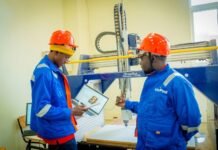By Esther Wright
In a proactive move towards fostering community welfare and ensuring regulatory compliance, a delegation of Government officials, led by Development Secretary, Peter Sam-Kpakra, of the Ministry of Planning and Economic Development (MoPED), paid a working visit to Marampa Mines Limited in Lunsar on Saturday, May 11th, 2024.
The visit, orchestrated by the National Development Induced Resettlement Secretariat and attended by representatives from various Ministries, was strategically aimed at evaluating the company’s adherence to National Development Induced Resettlement laws while actively engaging with stakeholders in the mining community.
Central to the agenda was the imperative of securing the well-being of the project-affected individuals through appropriate resettlement measures before green lighting any further mining operations. A comprehensive briefing session with the Management was followed by on-site inspections, providing officials with firsthand insights into the concerns and grievances of the affected populace.
During these interactions, community members were given a platform to express their views on the proposed relocation plans and voice any overarching issues. The sincerity of the dialogue underscored the Government’s commitment to inclusive decision-making and prioritizing the welfare of the local populace.
Acknowledging the complexity of the challenges at hand, officials announced plans for a subsequent meeting to delve deeper into the identified issues and chart a collaborative path forward. This forthcoming discussion will serve as a forum for evaluating the outcomes of the inspection and reinforcing the shared goal of sustainable development and community well-being.
The proactive stance taken by Government authorities exemplifies a dedication to balancing economic imperatives with social responsibility, signaling a positive trajectory for responsible corporate conduct within the mining sector.
The visit to Marampa Mines Limited stands as a testament to the G overnment’s proactive approach in safeguarding community interests and ensuring regulatory compliance in the extractive industry. By prioritizing dialogue and engagement, officials are paving the way for a more equitable and sustainable model of development, one that places the welfare of affected communities at its core.




